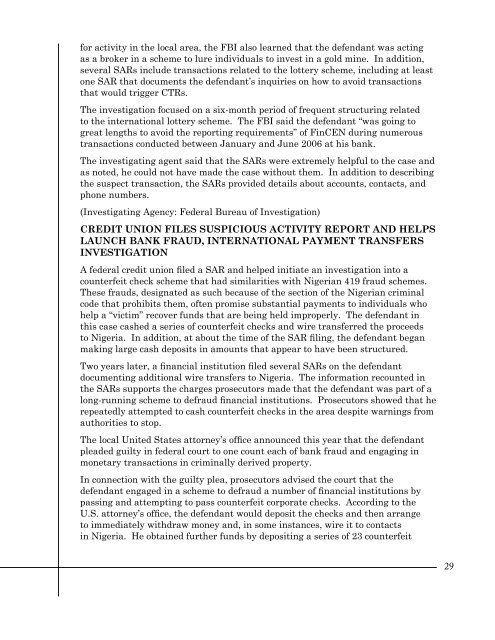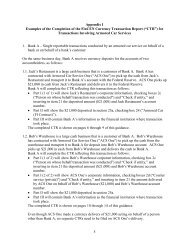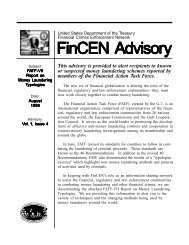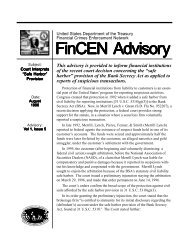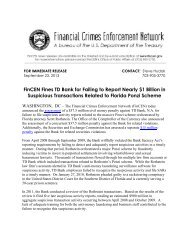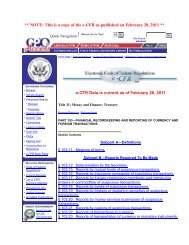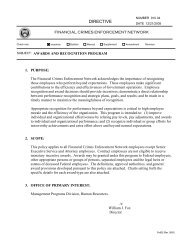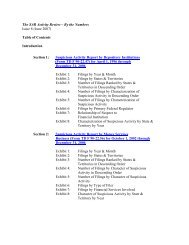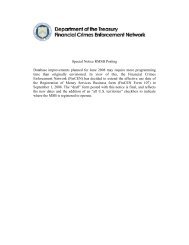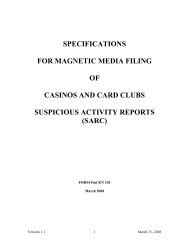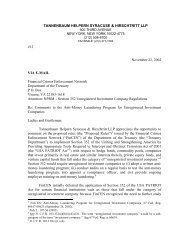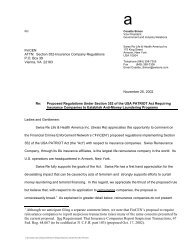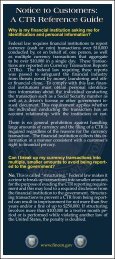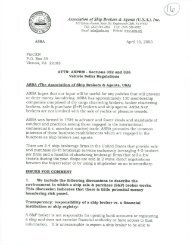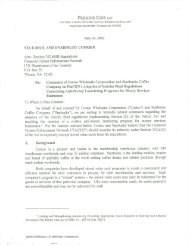The SAR Activity Review Issue 12 - FinCEN
The SAR Activity Review Issue 12 - FinCEN
The SAR Activity Review Issue 12 - FinCEN
Create successful ePaper yourself
Turn your PDF publications into a flip-book with our unique Google optimized e-Paper software.
for activity in the local area, the FBI also learned that the defendant was acting<br />
as a broker in a scheme to lure individuals to invest in a gold mine. In addition,<br />
several <strong>SAR</strong>s include transactions related to the lottery scheme, including at least<br />
one <strong>SAR</strong> that documents the defendant’s inquiries on how to avoid transactions<br />
that would trigger CTRs.<br />
<strong>The</strong> investigation focused on a six-month period of frequent structuring related<br />
to the international lottery scheme. <strong>The</strong> FBI said the defendant “was going to<br />
great lengths to avoid the reporting requirements” of <strong>FinCEN</strong> during numerous<br />
transactions conducted between January and June 2006 at his bank.<br />
<strong>The</strong> investigating agent said that the <strong>SAR</strong>s were extremely helpful to the case and<br />
as noted, he could not have made the case without them. In addition to describing<br />
the suspect transaction, the <strong>SAR</strong>s provided details about accounts, contacts, and<br />
phone numbers.<br />
(Investigating Agency: Federal Bureau of Investigation)<br />
CREDIT UNION FILES SUSPICIOUS ACTIVITY REPORT AND HELPS<br />
LAUNCH BANK FRAUD, INTERNATIONAL PAYMENT TRANSFERS<br />
INVESTIGATION<br />
A federal credit union filed a <strong>SAR</strong> and helped initiate an investigation into a<br />
counterfeit check scheme that had similarities with Nigerian 419 fraud schemes.<br />
<strong>The</strong>se frauds, designated as such because of the section of the Nigerian criminal<br />
code that prohibits them, often promise substantial payments to individuals who<br />
help a “victim” recover funds that are being held improperly. <strong>The</strong> defendant in<br />
this case cashed a series of counterfeit checks and wire transferred the proceeds<br />
to Nigeria. In addition, at about the time of the <strong>SAR</strong> filing, the defendant began<br />
making large cash deposits in amounts that appear to have been structured.<br />
Two years later, a financial institution filed several <strong>SAR</strong>s on the defendant<br />
documenting additional wire transfers to Nigeria. <strong>The</strong> information recounted in<br />
the <strong>SAR</strong>s supports the charges prosecutors made that the defendant was part of a<br />
long-running scheme to defraud financial institutions. Prosecutors showed that he<br />
repeatedly attempted to cash counterfeit checks in the area despite warnings from<br />
authorities to stop.<br />
<strong>The</strong> local United States attorney’s office announced this year that the defendant<br />
pleaded guilty in federal court to one count each of bank fraud and engaging in<br />
monetary transactions in criminally derived property.<br />
In connection with the guilty plea, prosecutors advised the court that the<br />
defendant engaged in a scheme to defraud a number of financial institutions by<br />
passing and attempting to pass counterfeit corporate checks. According to the<br />
U.S. attorney’s office, the defendant would deposit the checks and then arrange<br />
to immediately withdraw money and, in some instances, wire it to contacts<br />
in Nigeria. He obtained further funds by depositing a series of 23 counterfeit<br />
2


